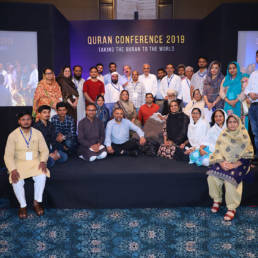INTRODUCTION
ABOUT MAULANA
Maulana Wahiduddin Khan is an Islamic spiritual scholar who has adopted peace as the mission of his life. Known for his Gandhian views, he considers non-violence as the only method to achieve success. Internationally recognized for his contributions to world peace, he has received, among others, the Demiurgus Peace International Award, the Padma Bhushan, the Rajiv Gandhi National Sadbhavna Award and the National Citizen's Award. A recent book, The 500 Most Influential Muslims of 2009 by Georgetown University, Washington DC, has named him “Islam’s Spiritual Ambassador to the world.” His approach, the book points out, is “popular among Indians, both Muslim and non-Muslim.” Born in Azamgarh in 1925, the Maulana was educated in a traditional seminary. From his early years, he showed a voracious appetite for modern knowledge, spending entire days in the library. As a result he became well versed in both classical Islamic learning and modern disciplines. His extensive research led him to conclude that the need of the hour was to present Islamic teachings in the style and language of the post-scientific era.
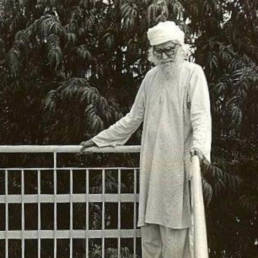
TAKE PROBLEMS AS A CHALLENGE
EARLY STAGES
Having lost his father, Fariduddin Khan, at an early age in 1929, he was brought up by his mother, Zaibunnisa Khatoon and his uncle, Sufi Abdul Hamid Khan, arranged for his education. He comments that becoming an orphan very early in life taught him that, to succeed in life, you have to take such situations as challenges and not as problems. You can lodge complaints or protests against the difficulties in your life. But if you take such situations as challenges, you will be able to positively and constructively work to overcome them, as and when suitable opportunities present themselves.
A LIFETIME DEVOTED TO LEARNING
EDUCATION AND INTELLECTUAL CHALLENGES
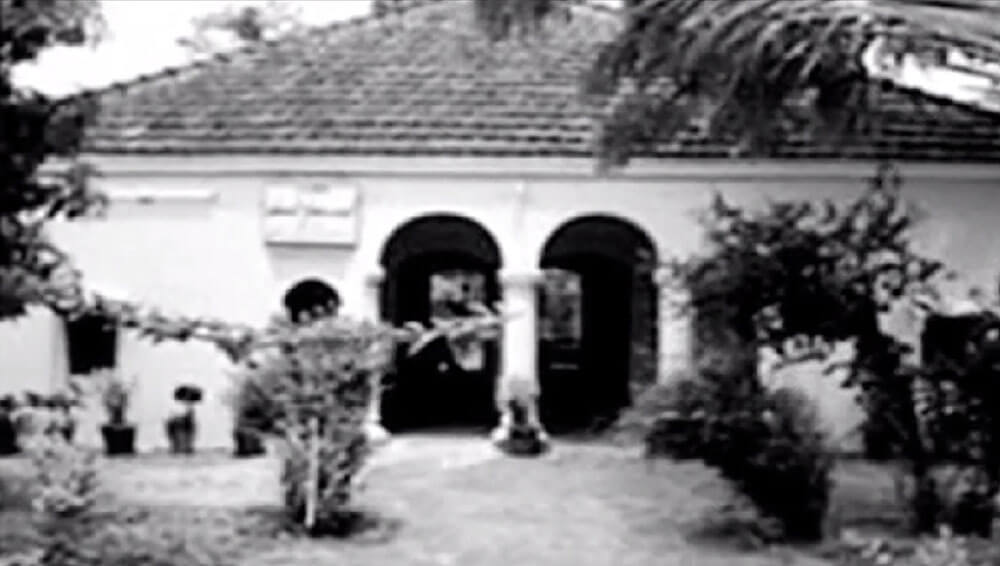 Since Maulana’s family was involved in India’s freedomstruggle from the very outset, as a very young man hebecame a nationalist with Gandhian values in the period prior to India gaining its independence in 1947, and he continues to be such till today. Although his brother, Abdul Muhit Khan, his cousin Iqbal Ahmad Sohail and other members of his family were sent to western-style schools for their education, the young Wahiduddin was enrolled at a traditional Islamic seminary, the MadrasatulIslah, in Sarai Mir, near Azamgarh in 1938 to receive religious education. Here he spent six years, completing this course and graduating in 1944.During some of his interactions with people after he had graduated, he was deeply shocked to realize that, although his education had been completed, he was not able to respond to statements and questions put to him by those who had received scientific education. Realizing that, without studying English and modern science, his education would be incomplete, the young Khan immersed himself in learning English and then went on to study innumerable books on science and contemporary thought.
Since Maulana’s family was involved in India’s freedomstruggle from the very outset, as a very young man hebecame a nationalist with Gandhian values in the period prior to India gaining its independence in 1947, and he continues to be such till today. Although his brother, Abdul Muhit Khan, his cousin Iqbal Ahmad Sohail and other members of his family were sent to western-style schools for their education, the young Wahiduddin was enrolled at a traditional Islamic seminary, the MadrasatulIslah, in Sarai Mir, near Azamgarh in 1938 to receive religious education. Here he spent six years, completing this course and graduating in 1944.During some of his interactions with people after he had graduated, he was deeply shocked to realize that, although his education had been completed, he was not able to respond to statements and questions put to him by those who had received scientific education. Realizing that, without studying English and modern science, his education would be incomplete, the young Khan immersed himself in learning English and then went on to study innumerable books on science and contemporary thought.
WHY SCIENCE DOES NOT DISPROVE GOD
THE SCIENCTIFIC BASIS OF RELIGION
Upon completion of his research, in 1955, Maulana Wahiduddin Khan published his first book, NayeAhdKeDarwaze Par, or ‘On the Threshold of a New Era’. This book, the result of his exhaustive studies, was further elaborated upon in his next work, IlmeJadid Ka Challenge, or ‘Islam and Modern Challenges’, which was later published as ‘God Arises: Evidence of God in Nature and in Science’. The book is a unique contribution to Islamic literature in that it logically examines the basis of atheism and provides a scientific basis to religious beliefs such as the existence of God and the life Hereafter. Another important book of Maulana’s from this period is Al-Islam, or ‘The Vision of Islam’, whichexplains the purpose of religion and its transformative role in the life of a human being. Continuing to write since then, Maulana has authored over 200 books.
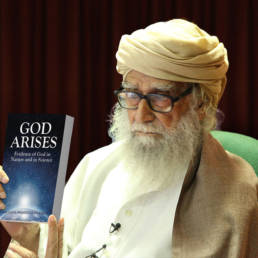
LITERATURE-BASED MOVEMENT
ISLAMIC CENTRE AND AL-RISALA MISSION
To give full expression to these positive ideas, he established the Islamic Centre at New Delhi in 1970. Subsequently, the organ of the Centre, Al-Risala – the monthly magazine – was launched in Urdu in 1976. This journal, consisting entirely of his own articles, quickly acquired a wide circulation throughout the Urdu-speaking world, and has done much to enlighten people about the peaceful ideas of Islam, to awaken in Muslims a new awareness of their responsibilities in the present age, to rekindle in Muslims the inner spirit of Islam and to promote positive thinking and action. The first issues of the English and Hindi versions of Al-Risala were launched respectively in 1984 and 1990. The English version continues to be published under the title Spirit of Islam. Now Al-Risala (Hindi) is being launched as Pavitra Jiwan.
FOSTERING TRUST AND GOODWILL
An Ambassador of Peace
In 1992, when the atmosphere was so highly charged throughout India due to the Babri Mosque incident, Maulana Wahiduddin Khan felt the necessity to convince people of the need to restore peace and amity between the two communities, so that the country might once again tread the path of progress. To fulfil this end, he went on a 15-day Shanti Yatra (peace march) through Maharashtra along with Acharya Muni Sushil Kumar and Swami Chidanand, addressing large groups of people at 35 different places on the way from Mumbai to Nagpur. This Shanti Yatra contributed greatly to the return of peace in the country. It is because of his advocacy of peace on the subcontinent and throughout the world and his espousal of the cause of communal harmony that he is respected by all communities and in every circle of society. Invited to meetings by all religious groups and communities within India and abroad, Maulana is, in effect, India’s spiritual ambassador, spreading the universal message of peace, love and harmony.
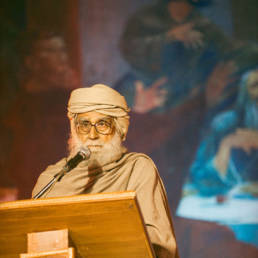
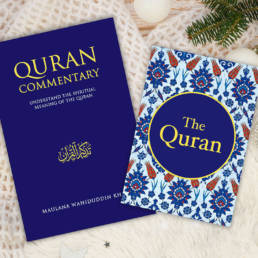
A CLEAR TRANSLATION OF THE QURAN
QURAN IN CONTEMPORARY ENGLISH
Realizing the need for a clear translation of the Quran, he translated the Quran into Urdu. This was subsequently translated into English. According to Maulana, there are more than a dozen translations of the Quran in English. However, the clarity that is there in the Arabic Quran is lacking in all of the translations. His English translationis now widely popular as simple and easy-to-read. Maulana has also written a commentary on the Quran which is titled in Urdu Tazkirul Quran. The English version of the commentary is available as Quran Commentary. The focus is on extracting the spiritual meaning of the verses of the Quran, seeking nearness to God and applying Quranic guidance to daily life experiences.
WHY BE PEACEFUL AND SPIRITUAL?
POPULAR BOOKS
Maulana Wahiduddin Khan has authored over 200 books on Islam, prophetic wisdom, spirituality and peaceful co-existence in a multi-ethnic society, the most recent being The Prophet of Peace: The Teachings of Prophet Muhammad,Jihad, Peace and Inter-Community Relations in Islam, The Age of Peace. These books analyze the basis of violenceperpetrated in the name of Islam, deconstruct the political interpretation of Islam and provide a pragmatic ideology of peace based on the Islamic scripture and the life of the Prophet. Many of his proposals have been utilized to de-escalate controversial disputes between communities in India and reinforce trust and goodwill among people from different religious backgrounds. Another genre that Khan is famous for is applied spirituality. His books such as Leading a Spiritual Life provide wisdom to those who seek to lead their life beyond materialism and choose to manage their life’s affairs instead of succumbing to tension and depression. Many of his articles on applying spirituality to resolve problems of our life are regularly published in the Speaking Tree column of The Times of India. These insights have great acceptability among people across diverse religious affiliations.
VIEW BOOKS
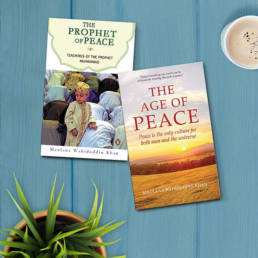
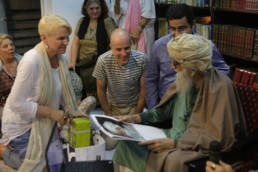
RELIGION AND FREEDOM OF THOUGHT
ISLAM IN THE MODERN AGE
Some of the essential features of the modern age are democratic governance, secularism, pluralistic societies, freedom of conscience and scientific learning. Maulana realized that the traditional literature on Islam which was compiled in the medieval times needs to take into account modern changes. Some of the questions he answers in his writings are: Is Islam compatible with democracy and secularism? Can Muslims live peacefully alongside people of other faiths? Is it necessary to re-establish an Islamic state as the ultimate goal of Islam? Does the Quran sanction violence against non-Muslims because they are non-believers? Should those who speak against the Prophet be punished due to blasphemy? If a person leaves Islam for another faith, will he be liable to death? A central theme found in Maulana’s writings is that Islam gives complete freedom to individuals. In Islam there is no concept of coercion, either at the individual level or state level. Faith is a matter of one’s conscious intellectual discovery and not compulsive following imposed by any external authority.
NON-PROFIT ORGANIZATION
Centre for Peace and Spirituality International
Maulana Wahiduddin Khan has always been an advocate of working in a low-profile way. This includes addressing the minds of individuals rather than speaking to crowds from stage. Individuals constitute the basic unit of a society, and if individuals are prepared to live according to the culture of peace, it would have a far-reaching effect in reform of the nation as a whole. To this end, he set up Centre for Peace and Spirituality, or CPS International, a non-profit organization founded in 2001. CPS members come from all walks of life. Being spiritually and intellectually trained, they have taken it as their life’s mission to become ambassadors of peace for the world. Many of CPS activities focus on engaging in dialogue with people of other religions in the spirit of mutual learning, undertaking translations of the Quran in different languages and conveying its message to those who are inquisitive and participating in conferences and seminars to systematically present the Islamic position with respect to modernity. Members of CPS around the world have distributed over six million copies of the Quran.
